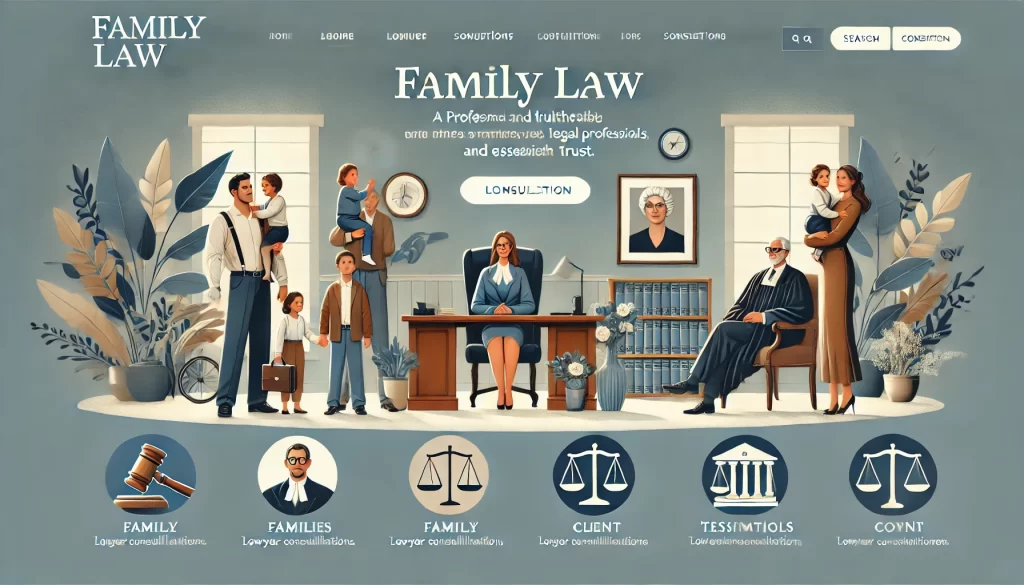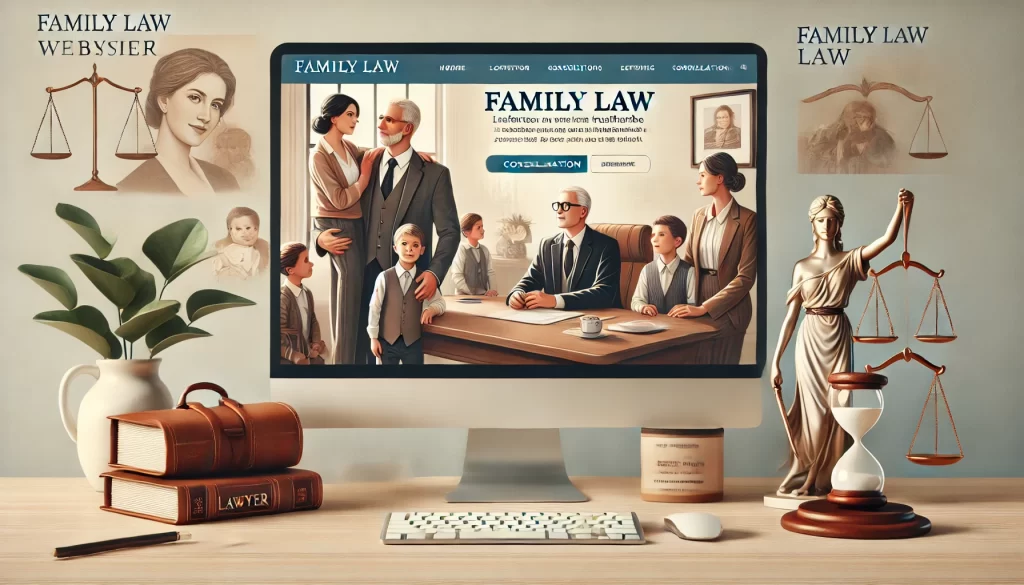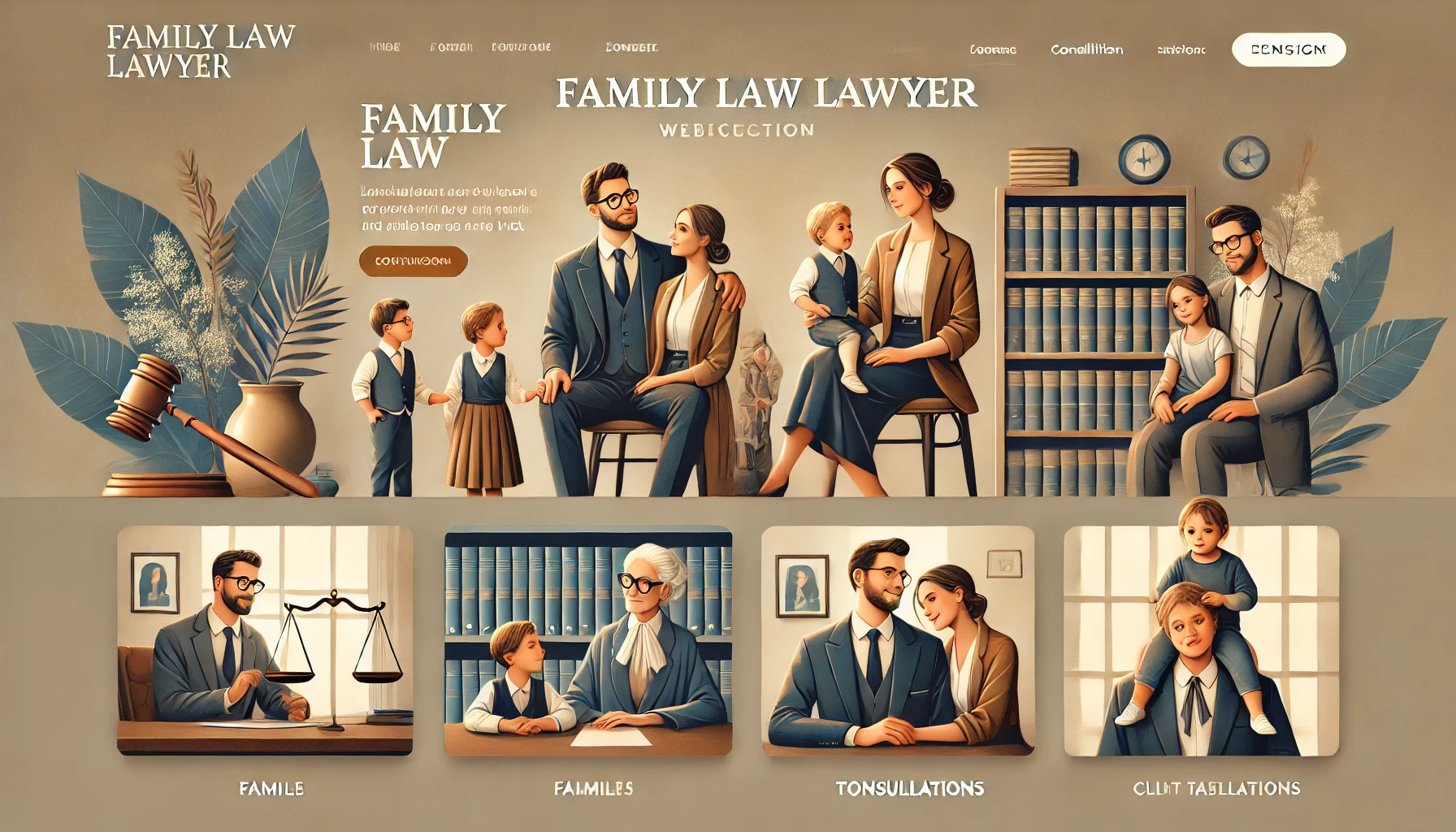Why Family Law Lawyer Website Design Matters
In the competitive world of legal services, a family law lawyer’s website design is more than just a digital presence—it’s a crucial tool in establishing trust, credibility, and empathy with potential clients. When it comes to family law, clients are often dealing with some of the most emotionally charged and personal issues of their lives—divorce, child custody, adoption, and more. A well-designed family law website can help alleviate some of this emotional burden by providing clear, compassionate, and easy-to-navigate content that addresses their needs and concerns.
For a family law practice, the website must act as a beacon of trust and support, showcasing the firm’s expertise while fostering an environment of empathy and professionalism. A good family law lawyer website design not only focuses on aesthetics but also on the client’s experience, addressing their unique needs and emotions. It should make them feel comfortable enough to reach out for help, offering a smooth path from their first visit to the moment they reach out for a consultation. We’ll explore what makes a good family law website, highlight essential features, and offer insights on how to create a website that stands out in the competitive family law market.

What Makes a Good Family Law Lawyer Website?
Empathy and Client-Centered Design
The essence of family law is rooted in empathy. Clients seeking family law services are often facing emotionally charged situations, and their first interaction with a law firm might be one of distress or confusion. Therefore, the design of a family law website needs to reflect empathy and understanding. The tone of the website should be warm, welcoming, and supportive while still conveying professionalism and competence.
A good family law lawyer website design is more than just functional; it builds trust by showing clients that the firm understands their struggles and is here to help. From the moment clients land on your homepage, they should feel heard and respected. Here are a few ways to achieve that:
Related Posts
- Compassionate Language: The copy on your site should be thoughtful and sensitive to the issues clients are facing. Avoid legal jargon and instead use clear, approachable language that puts potential clients at ease.
- Visual Design: The visual elements—colors, fonts, and images—should be calming and neutral. Soft blues, greens, and whites evoke a sense of trust and tranquility, while an organized, clean layout ensures clients don’t feel overwhelmed by too much information.
- Personal Touches: Incorporate bios of your attorneys, showcasing their experience and commitment to family law, along with testimonials or success stories from previous clients who have had positive experiences with your firm. This helps build a connection with prospective clients.
Clear and Intuitive Navigation
The user experience is vital for family law websites. Clients looking for legal help need fast access to the right information. A well-organized, easy-to-navigate website design is essential to ensure potential clients can quickly find the information they need without feeling frustrated or overwhelmed.
A clear navigation structure should guide users to the most relevant sections of the site, such as:
- Divorce and Separation Services
- Child Custody and Support
- Adoption Law
- Domestic Violence Assistance
- Legal Consultation and Contact Information
The easier it is for clients to find what they’re looking for, the more likely they are to take the next step and reach out to your law firm for help.

Features for Family Law Lawyer Websites
When designing a family law lawyer website, certain features can significantly enhance the user experience while also demonstrating your firm’s expertise and commitment to providing compassionate legal assistance. Below are some of the essential features that can make your family law website not just functional but effective in converting visitors into clients.
Client Intake Forms
One of the most important features of any law firm website, especially in family law, is a client intake form. Potential clients often visit law firm websites to seek legal advice or initiate the process of working with an attorney. A simple and secure online intake form allows clients to provide their basic details and describe their legal issue before scheduling a consultation.
By offering this feature, your law firm can quickly gather important information, which helps attorneys prepare for initial consultations more effectively. Additionally, this feature can make potential clients feel that their case is being taken seriously from the outset, which fosters trust and a sense of security.
Compassionate Content and FAQs
Clients visiting your website likely have many questions and concerns, particularly around emotionally difficult topics like divorce, custody battles, or child adoption. Having a robust FAQ section on your website can help address these concerns before a client even picks up the phone.
The FAQ section should provide clear and concise answers to the most common questions clients may have, such as:
- What should I expect during a divorce process?
- How do I prepare for a child custody hearing?
- What are the costs involved in hiring a family law lawyer?
By providing valuable, client-centered content, you demonstrate your firm’s expertise in family law, while also alleviating anxiety for potential clients. The more helpful your website is in answering their questions, the more likely they are to feel comfortable contacting you.
Trust Signals – Testimonials and Case Studies
When it comes to choosing a family law lawyer, trust is paramount. Testimonials and case studies from past clients are powerful tools for building trust. Consider including a testimonial section on your homepage or landing pages. Testimonials should highlight clients’ experiences with your firm, focusing on the emotional support, professionalism, and successful outcomes you provided.
Case studies can showcase more detailed success stories, demonstrating how your firm has effectively navigated complex family law issues. These case studies not only build authority but also show potential clients that you have a history of handling similar situations with care and success.
Related Posts
Secure Online Consultation Booking
For many people, the process of finding a family law lawyer is daunting. Offering a secure online consultation booking system makes the process easier and more convenient. By allowing clients to book a consultation directly through your website, you eliminate unnecessary back-and-forth communication, streamlining the process and making it more accessible to busy clients.
This feature also signals that your firm is tech-savvy and client-focused, improving both the experience and trustworthiness of your website.
CTA – Let Us Design a Compassionate, Easy-to-Navigate Family Law Website for Your Practice
If your family law firm needs a website that resonates with potential clients while reflecting your expertise and commitment, it’s time to invest in a custom family law lawyer website design. At [Your Company Name], we specialize in creating websites that help family law attorneys build trust with their clients, improve their online visibility, and enhance their overall online presence.
Ready to take your family law practice to the next level? Contact us today to discuss how we can help design a compassionate, client-centered website for your practice.
FAQs
What makes a good family law lawyer website design?
A good family law lawyer website design should focus on empathy, ease of navigation, and client-centered content. It should include features such as client intake forms, FAQs, and trust signals like testimonials and case studies. The goal is to create a website that reflects the sensitive nature of family law while also providing clear, helpful information.
How can I ensure my website design is empathetic?
To create an empathetic website design, use compassionate language, calming colors, and soft visuals. The tone should be warm and welcoming, addressing client concerns in an understanding way. Including attorney bios and success stories can also help build an emotional connection with potential clients.
What are the essential features of a family law website?
Key features for a family law website include client intake forms, compassionate FAQs, testimonials, case studies, and secure online consultation booking. These features not only improve the user experience but also help potential clients feel more comfortable and informed.
Why is an online intake form important for a family law website?
An online intake form allows potential clients to submit their information securely and provide details about their case before meeting with you. This feature saves time, ensures better preparation for consultations, and can help potential clients feel more confident in your firm’s professionalism.
Key Takeaways
A family law lawyer’s website design plays a crucial role in attracting, engaging, and converting clients. By incorporating empathy-driven design, user-friendly navigation, and key features such as client intake forms and FAQs, law firms can create an online presence that builds trust and addresses the unique needs of clients in emotionally difficult situations. Investing in a custom-designed website is essential for family law firms looking to stand out, provide value, and grow their practice.
- A good family law website design should reflect empathy and professionalism, addressing the unique needs of clients in emotionally charged situations.
- Client intake forms, compassionate FAQs, and trust signals such as testimonials are essential features for improving user experience and building trust.
- Personalized content, including success stories and attorney bios, can foster stronger connections with potential clients.
